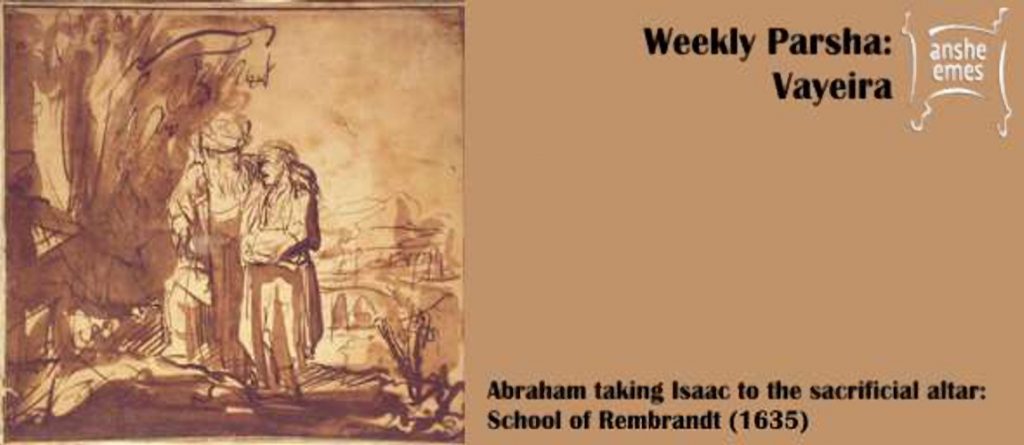
Weekly Parsha: Vayeira
I. Summary
A. Abraham Is Visited By Three Angels; The Promise of Yitzchak (Isaac). Three days after his Bris, Abraham sat at the entrance of his tent hoping to greet visitors. Three individuals (actually disguised angels sent by Hashem to perform special duties) appeared. Abraham ran to welcome them and show them hospitality. One of the angels told Abraham that Sarah would give birth to a son in a year. Sarah (then almost 90) laughed inwardly at the news, for which Hashem rebuked her for doubting Him. Before leaving, the second angel healed Abraham’s pain/sickness from his Bris.
B. Abraham Intercedes On Behalf of S’Dome and Amorah. Before the third angel began the destruction of S’dome and Amorah, Hashem forewarned Abraham. Abraham prayed on the people’s behalf, and argued with Hashem that they should be spared if at least ten righteous people could be found among them.
C. The Angels Arrive in S’Dome. Two of the angels arrived in S’dome (i.e, one of them was there to save Lot and his family; the other was there to destroy the city). The angels — still outwardly mere humans — were invited by Lot to stay with him and his family. When word got out, the townspeople gathered around Lot’s house and tried to molest the angels, for which Hashem punished them with blindness.
D. Lot and his Family Leave S’Dome; The Cities Are Destroyed. The angels told Lot of Hashem’s plan and instructed him to leave with his family. Lot, concerned about his money and possessions, hesitated but was placed (along with his family) by the angels outside the city. The angels warned them not to look back (since they were only being saved through Abraham’s merit, they had no right to observe the others’ punishment) and to stay away from the plains surrounding the cities. At Lot’s request, Hashem allowed them to stay in Tzoar. Hashem then destroyed the cities of S’dome, Amorah and the entire surrounding plains. When Lot’s wife disobeyed the angels’ warning and looked back, Hashem turned her into a “pillar of salt”. Lot moved into a cave in a nearby mountainous area.
E. Abraham and Sarah Travel to Gerar. Abraham and Sarah traveled to the Negev (the South of Israel) to Gerar, where Abraham again instructed Sarah to say that she was his sister. Sarah was taken into King Avimelech’s household; however, when Hashem caused illness to befall his household and warned him that he would die if he didn’t release Sarah to Abraham, Avimelech complied. Abraham prayed for him and Hashem cured his household.
F. Yitzchak is born; Hagar & Yishmael are sent away. As promised, Yitzchak was born to Abraham and Sarah one year later. (See attached chart for family tree.) Abraham circumcised Yitzchak when he was 8-days old. As Yitzchak was growing up, Sarah feared Yishmael’s negative influence and urged Abraham to send him and Hagar away. Abraham was unhappy with Sarah’s request, but Hashem told him to follow Sarah’s advise and promised that Yishmael would become a large nation. Abraham gave Hagar and Yishmael food and water and sent them into wilderness, where they wandered for days. When it appeared that they might die from thirst, an angel appeared, showing them water and assuring Hagar of Yishmael’s future. Yishmael grew up to be a bowman and lived in Paran.
G. The Akeidah (“Binding of Yitzchak”). As the tenth (and most difficult) test of his loyalty to Hashem, Hashem instructed Abraham to sacrifice Yitzchak. Without hesitation, Abraham awoke early the next morning, made the necessary preparations himself, and began the journey to take Yitzchak to a place to be designated by Hashem. They arrived at this place three days later. Abraham built an altar and bound Yitzchak. As he lifted the knife to sacrifice Yitzchak, an angel called out and instructed him not to harm Yitzchak. Abraham found a ram and sacrificed it instead. In recognition of his great “z’chus” (merit), Hashem promised to bless him and that this children would be many and his descendants would inherit their enemies’ cities.
II. Divrei Torah
A. Lil’Mode U’lilamed (Rabbi Mordechai Katz)
The Importance of “Chesed” (kindness) and “Hachnosas Orchim” (hospitality). Abraham was the model of “chesed” and “hachnosas orchim”. Even while recovering from his Bris and despite the intense heat, Abraham still extended tremendous hospitality to the three visitors. What’s more, Abraham ensured that his guests would feel like they were imposing, promising them a mere “morsel of bread”, yet giving them an elaborate meal. Once a husband and wife were traveling through a village on Erev Shabbos when they happened to notice a small house. As they were very tired from the journey, they wanted to ask the owner to put them up, but were afraid that he/she would ask too high a price and so they decided to keep moving. However, the wheel on their carriage broke and they had no choice but to ask the owner to put them up for Shabbos. When they approached the owner, Rav Yeshaya , he told them the room rate was five Rubles (a large sum), but that they could eat as much as they wanted. Having no other choice, they agreed to his price, rationalizing that they could at least eat as heartily as they desired. As a result, they enjoyed their Shabbos meals very much, and slept quite peacefully. When Shabbos was over, however, Rav Yeshaya refused their money, saying “I never had any intention to take your money . . . however, I sensed that if I told you at the outset that I wouldn’t accept money, you would feel very uncomfortable and would not accept our hospitality. I wanted you to enjoy Shabbos, and you did. That is payment enough.”
B. Growth Through Torah (Rabbi Zelig Pliskin)
1. Consider it an honor to do acts of kindness for another person. Abraham pleaded with the three men who passed near his tent to accept his hospitality, saying: “because you have passed by your servant.” Rashi comments “this [to be my guest] I request of you because you have passed by, for my honor. Rabbi Yeruchem Levovitz cites the Talmudic principle that when someone gives something to a distinguished person, the fact that the person accepts your gift is considered as if you received something from him/her.
a. Giving to an important person is actually taking. But who is “important”. To an arrogant person, everyone is considered beneath him/her. But a humble person considers everyone to be important. He honors and respects everyone and considers giving to any person as a personal favor to him. Abraham was such a person. While the three visitors appeared to be mere nomads, Abraham ran to greet them and bowed down before them. He personally felt more honor in their coming to be his guests that we would feel if the greatest people of our generation were to visit us.
b. Horav Nissan Alpert expounds on this (in Peninim on the Torah) –-why would Hashem send angels, rather than humans which would have allowed Abraham to perform the actual mitzvah of charity and hospitality? From this, we learn an important lesson. One should not think that it is his act of charity which enables the poor individual to survive. Hashem has many agents and vehicles for taking care of His children, and these individuals would ultimately find another means of support. The purpose of the mitzvah of charity and hospitality is to benefit the giver, not the recipient. Just as Abraham was transformed into the beneficiary since the “poor people” were actually angels, so too we must realize that it is the giver who is indebted to the receiver.2. Trust in Hashem and you will always have hope. We read the section respecting Yitzchak’s birth on Rosh Hashonah. The reason for this is to develop hope and trust in Hashem. Nothing is impossible for Him. Sarah was already 90 years old and according to conventional wisdom it would have been impossible for her to give birth to a child. Yet, since Hashem willed it, she gave birth to Yitzchak. Even when a situation seems bleak and the probability for salvation seems unlikely, do not give up hope. Hashem’s law is more powerful than the law of averages. This awareness is so important for our daily lives that at the beginning of each year we repeat the message: never despair!
C. Majesty of Man (Rabbi A. Henach Leibowitz)
1. Jealousy and Bitachon (“faith in Hashem”). In Midrash Rabbah, we find that Yitzchak was not an unwitting participant in the Akeidah — to the contrary, he was an equal partner with Abraham. The Midrash relates how the Satan — the evil inclination — cunningly attempted to dissuade the pair from their mission. After failing with Abraham, he turned toYitzchak and unsuccessfully tried many different arguments. The Satan then pointed out that following Yitzchak’s death all of his prized possessions would be given to his brother Yishmael. It was this argument that caused Yitzchak pause (albeit for only the slightest moment). What was it about this argument? Even the kind, unselfish Yitzchak was momentarily affected by the evil passion of jealousy. In order to guard against the influence of jealousy, we must concentrate on strengthening our bitachon. There is no way to feel threatened by any situation or deprived of any object when we wholeheartedly believe that Hashem is taking care of us and we are totally in His hands.
2. Chesed and Kiddush Hashem (“sanctification of Hashem’s name”). The Torah highlights Abraham’s kindness to the three angels in elaborate details; yet, the written Torah doesn’t make mention of a seemingly greater act performed by Abraham — when forced by King Nimrod to accept idol worship or be burned alive, Abraham chose death by fire and refused to recant his beliefs (although Hashem allowed Abraham to miraculously emerge unharmed from the fiery furnace). Why isn’t this episode emphasized, or even mentioned? Rabbi Nosson Tzvi Finkel used this question to reveal a deeper understanding of the concept of “chesed” (kindness). Hashem created, and constantly sustains, the world with chesed. It we can define our limited comprehension of Hashem’s actions towards ourselves and the universe in a single word, it is chesed. As an emulation of Hashem, Abraham’s hospitality was the expression of his profound belief and recognition of Hashem. When filled with the devotion, totality of spirit and energy of Abraham, chesed has the potential to be the greatest “Kiddush Hashem”, even greater than giving of one’s life. The Torah underscores the chesed of Abraham to enlighten us to the power we are capable of harnessing by helping one another. The Torah is telling us that not only by giving our lives, but by giving of ourselves to others, we also have the ability to rise to great heights. Opportunities abound.
D. Peninim on the Torah (Rabbi A.L. Scheinbaum)
The Akeidah. The Akeideh also teaches us a lesson about “Kiddush Hashem” (santification of Hashem’s name). As noted above, we tend to view Kiddush Hashem as one’s willingness to abdicate his/her life for Hashem. Yet, we often overlook another form of Kiddush Hashem — the ability to maintain one’s faith in Hashem despite serious hardships. The Jewish people’s ability to withstand suffering and deprivation is testimony to the eternity and greatness of their spirit. There is a famous story told of the Bluzover Rebbe, z’tl, which took place as he lit the Chanukah candles in concentration camp. Standing amidst death and desperation, he recited the first two blessings over the candles. When he came to the third blessing — the “Shehechiyanu” — blessing Hashem for keeping us alive and preserving us to reach this joyous occasion, he suddenly stopped, looked around the room into the faces of the other inmates and then recited the blessing. Later, he explained why he hesitated. How could he say this blessing amidst the immense suffering? However, he noticed the throng of Jews who, despite their obvious misery, stood resolute with tears streaming down from their glistening eyes. Their faces expressed faith and concentration as they listened to the blessings. He, therefore, felt it was mandatory to exalt Hashem. A people who continues to serve Hashem despite all of the anguish which its members have undergone truly exemplifies the concept of Kiddush Hashem.
E. Kol Dodi (Rabbi David Feinstein)
Never pass up an opportunity to do a mitzvah. Abraham ran to greet the strangers, offering to serve them food and drink and begging them not to leave without accepting his hospitality. His words “because for this you have passed your servant’s way”. Why did he use the words “for this”? Abraham believed that the men had been sent by Hashem specifically to give him the opportunity to perform a mitzvah. Thus, he was saying you are coming to me “for this”, i.e., for the purpose of allowing me to give you food and drink. This gives us a picture of Abraham’s greatness; it never entered his mind to complain that the men were causing him trouble or expense at a time at which he wasn’t feeling well. To the contrary, he believed that they were only there for his benefit, to give him the opportunity to perform a mitzvah. For this we learn that we should never pass up the opportunity to perform a mitzvah.
F. Living Each Day (Rabbi Abraham Twerski)
Living with equanimity. “And Abraham arose early in the morning.” One of the commentators points out a tiny detail in the story of the Akeidah wich is often overlooked. If Abraham “awoke”, then obviously he slept during the night. That is what distinguishes Abraham. Knowing that he would have to sacrifice his son didn’t disturb his sleep. He faced this challenge with equinimity. The Talmud states that one must praise Hashem for the bad things as well as the good things. It further requires that this praise be with “simchah”; Rashi points out in this case “simchah” doesn’t mean joy, but with a “perfect heart” (i.e., with acceptance that whatever G-d does is just, even though it may be very distressing and appear to us to be unjust). Equnimity is not easily acheived. We welcome pleasant things, but are upset when our wishes are denied or frustrated. Personal losses (whether personal or material) cause us to be depressed. We may think that it is beyond possiblity for a person to have the same reaction to adversity that he does when his fondest wishes are fulfilled. For Abraham, there was only one reason for existence — to do the will of G-d. What does this say to us? Are we expected to acheive a self-effacement as complete as that of Abraham? Hardly. The Talmud states that a person should aspire that his actions reach those of his ancestors, but to “reach” does not mean to “equal”. Yet, while we may not be able to acheive their greatness, there should at least be some point of contact between our ancestors and ourselves. To whatever degree we can acheive self-effacement or align our will with the will of Hashem, to that degree we can acheive equinimity, a more serene and tranquil attitude towards life which at once gives us the courage to acheive while allowing us to accept those things we can not change.
G. Living Each Week (Rabbi Abraham Twerski)
1. Loving Your Fellow Man. “G-d appeared unto him [Abraham] in the fields of Mamre, as he sat at the door of the tent in the heat of the day.” The Talmud teaches that Abraham was sitting at the door of his tent so that he would look for wayfarers to invite into his home for rest and refreshment. Abraham was the personification of chesed (loving kindness) and was so drawn to acts of kindness that he actively sought opportunities to perform them. The Baal Shem Tov teaches that the way to achieve the love of G-d is to love other people.
2. Denial and Self-Deception. “Sarah denied, saying, ‘I did not laugh,’ because she was afraid.” The S’fas Emes says that Sarah did not lie, but rather she denied — she was actually unaware – that she had laughed. Her denial was the result of her intense piety, “because she was afraid”– because her fear of G-d was so profound that she could not conceive it possible for her to have doubted G-d’s word. We too are often unable to accept something about ourselves because it seems so alien to our self-perception. While such denial is not willful distortion of the facts, it is no less destructive, because it stands in the way of our realizing the full truth about ourselves and, ultimately, improving ourselves.
3. True Teshuvah (Repentence). “[The angel said to Lot], escape with your life; do not look behind you”. This verse is a powerful lesson in combating our yetzer hara (evil inclination), which often detracts from the performance of mitzvot by causing us to reflect on past misdeeds. True teshuvah consists of avoiding doing what is wrong and dedicating ourselves to doing what is right. Ruminating about our past misdeeds is not only unessential to teshuvah, but can actually be antagonistic to it.
H. Pirkei Torah (Rabbi Mordechai Gifter).
1. Transformation into perfection. Lot’s daughters violated one of the seven Noahide laws, yet Moshiach will descend from her son Moab. Why will our ultimate redeemer stem from such unseemly background? Our mission is to refine and perfect the world, enabling the Divine presence to reside within it, and this goal will be realized with the advent of Moshiach. Mochiach, who will bring the world to ultimate perfection, will himself be one who has transformed a deficient essence into one of elevation and perfection.
2. Inspiration Into Action. Immediately after the Akeidah (the binding of Isaac), Isaac went to the Yeshivah of Shem for three years. Why was it necessary for Isaac to go directly to the yeshivah and not stop at home first? Akeidah instilled Isaac with holiness and elevated him to great spiritual heights. This holiness required continuity which was possible only through immediately delving into Torah. When inspired spiritually, we too must immediately turn such inspiration into action.
I. Windows To the Soul (Rabbi Michael Bernstein).
The Ram’s Horn. Upon hearing the angel call out to him to stay his hand from sacrificing his son, Abraham looked around to see what he could sacrifice on the altar he had prepared for G-d. Abraham saw a ram and offered it in his son’s stead. Why a ram? And, why does the Torah go into such detail (noting that the ram was “caught in the bramble by its horns”)? To remind us of the Divine providence that guides all our lives. It was no coincidence that the ram was entangled there. G-d engineered its presence so it should be there, available at the moment Abraham refrained from sacrificing Isaac. Therefore, we are told of its entanglement, so that we will associate the horn with the Divine providence for all generations.
J. Reflections On the Sedra (Rabbi Zalman I. Posner).
A Personal Touch. Abraham exemplified the trait of hospitality. Despite his age and infirmity (and his wealth of servants), he personally served his visitors and saw them on their way. Doing good involves more than arranging to have good done.
K. Something to Say (Rabbi Abraham Goldwasser).
Cry To The Heavens. “And G-d heard the voice of the lad [Ishmael]. The Kotzker Rebbe asked how it is that the Torah tells us that G-d heard Ishamael’s voice, when we have no indication that he cried out at all. We are told only of his mother, Hager, who “raised her voice and cried.” He explains that sometimes we can cry from the depths of our heart without uttering a single syllable. This cry can pierce the heavens, rising so high that it is heard by G-d alone.
L. Vedibarta Bam (Rabbi Moshe Bogomilsky).
Helping Others. The order to bring Isaac as a burnt offering came directly from G-d. Why did the order to stop come from an angel (and not from G-d)? We should never harm another person without a direct command from G-d. To help another person, however, one needs no command. Therefore, to let Isaac live, the instruction of an angel sufficed.
M. Torah Gems (Rabbi Aharon Yaakov Greenberg)
1. True Modesty. Even though Abraham reached the elevated level of having G-d appear to him, he nevertheless sat at the tent door and believed that he was not worthy of looking at G-d. (S’fas Emes).
2. True Modesty. Abraham considered every person as greater than himself, for as we read “these men “stood by” [or “above”] him. The test of whether a commandment is done properly is whether its fulfillment makes us feel more humble, rather than more conceited. (Mikra Meforash).
3. The Importance of Hospitality. Abraham’s model teaches us, as articulated by R’Judah in the Talmud, that “hospitality to guests is greater than greeting the Divine Presence” (Shabbat 127).
4. Reciprocity. The way we behave is the way we are treated. Abraham said, “I will fetch a morsel of bread,” and G-d gave manna for forty years. (Mekhilta, Beshalah).
5. Opening Our Eyes. “And G-d opened her (Hagar’s) eyes, and she saw a well of water.” R’Binyamin said, “All are presumed to be blind until G-d opens their eyes.” The Hidushei Ha-Ram said, we can deduce from this that whatever we need is available to us, but we must have the fortune to have G-d open our eyes so that we can see what is around us.
N. Soul Of The Torah: Insights of the Chasdic Masters of the Weekly Torah Portions (Victor Cohen).
1. “Hashem Appeared to Him [Abraham]”. The S’fas Emes commented that everything in the universe has a Divine aspect within it. All we have to do is peel away the shell, the material part, and the Divine within it will appear.
2. “He was Sitting at the Entrance of the Tent.” R’Yaakov Yosef of Polnoye commented that it is the sign of a truly righteous person that he/she is all always “at the entrance.” That is, he/she is aware that he/she has much to do and much to accomplish.
3. A Lesson in Hospitality. “He [Abraham] took butter and milk . . . and placed it before them.” The Chidushei Harim commented that we should learn from Abraham the meaning of hospitality – despite the fact that he was a prophet, 100 years old and was ill because it was only 3 days after his circumcision, he insisted on serving his guests himself.
O. There Shall Be Light (Rabbi Yitzchak Meir Goodman)
When Man Stands Above Angels. “And [Abraham] took butter and milk and placed [it] before [the angels] and he stood over them and they ate.” Initally, the angels stood over him; now that the positions were reversed. For, when Abraham was sitting at the door of his tent, the angels naturally towered over him in spiritual greatness. However, once he was engaged in a mitzvah (i.e., hospitality), he “stood over the angels,” whose greatness is natural and impervious to temptation. In other words, in doing a mitzvah wholeheartedly, we rise above angels. (The Belzer Rebbe)
The Importance of Self-Sacrifice. “And G-d said, ‘Shall I hide from Abraham that which I [intend to] do?'” The Chasem Sofer derives an important principle from this verse: Abraham’s level of prophecy did not justify his knowing everything that G-d planned. But, he had not reached this level only because he sacrificed so much of his time for others. His constant hospitality and preaching about G-d prevented him from pursuing personal spiritual growth. Dedicated to others, he sacrificed his own spiritual progress. Therefore, G-d says, “shall I deny him prophecy because of his goodness?” Two verses later, G-d explicitly acknowledges Abraham’s merit, “he will instruct his children and his household after him and they will observe the way of G-d.” Thus, G-d shared the information with him. The Chasem Sofer explains that each of us must share our time and knowledge, even at the expense of our own scholarship, for such was the example of Abraham.



 Visit the group and request to join.
Visit the group and request to join.
